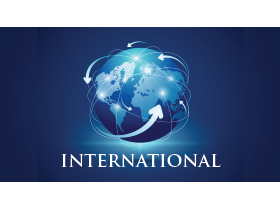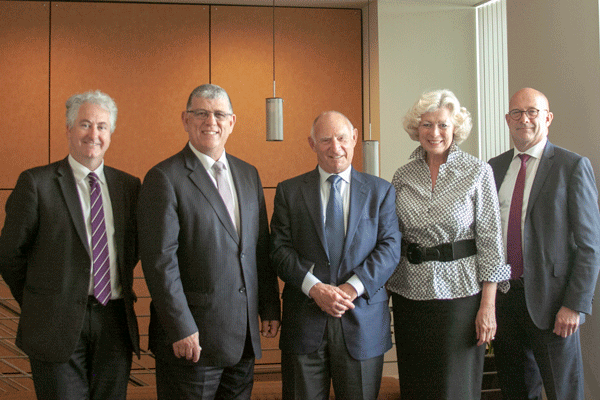 On Monday, August 6, California Chamber of Commerce President and CEO Allan Zaremberg and Vice President of International Affairs Susanne T. Stirling met with a delegation from the Parliament of New South Wales (NSW), Australia, led by the Honorable John Ajaka, President of the Legislative Council.
On Monday, August 6, California Chamber of Commerce President and CEO Allan Zaremberg and Vice President of International Affairs Susanne T. Stirling met with a delegation from the Parliament of New South Wales (NSW), Australia, led by the Honorable John Ajaka, President of the Legislative Council.
California and New South Wales share a Sister State relationship, a symbol of mutual goodwill, thereby encouraging bilateral cooperation. California and New South Wales, Australia became sister states through a resolution in 1997 as the two states share many economic and cultural similarities.

Similarities
California and New South Wales both have diverse landscapes, are key exporting states for their respective countries, and have agriculture and mining industries that are vital to both states’ economies.
More recently, the two have shared a similarity in the wine industry and growing service sector, as well as the film, sports and leisure industries.
The group discussed the structure of the NSW Parliament, governance issues, infrastructure projects, research and development, and technology exchanges. Recognizing the U.S.-Australia Free Trade Agreement, there was discussion of the new Trump administration proposal of the Indo-Pacific Vision, encompassing a region of 14 countries, including Australia, Bangladesh, Burma, India, Indonesia, Japan, Malaysia, New Zealand, Philippines, Singapore, South Korea, Taiwan, Thailand and Vietnam.
Australia is one of the United States’ oldest and closest allies and shares our common values and history. Australia has been an active participant in international affairs since World War I and has fought beside the United States and other allies in every significant conflict to the present day, joining coalition forces in the Persian Gulf in 1991, Afghanistan in 2002, and Iraq in 2003. The United States and Australia share impressive economic and productivity growth. Australia is the 13th largest economy in the world. With legal, regulatory and ideological similarities between the United States and Australia, and with the background of our military and security relationship, Australia is an ideal trading partner. The United States and Australia have major interests in each other’s economies. The United States has long had a large trade surplus with Australia.
U.S.-Australia Trade
As the 16th largest export destination for the United States, Australia has always enjoyed a strong trade relationship and a diverse portfolio with the United States.
In 2017, total exports from the United States to Australia were $24.6 billion with top categories being transportation equipment, non-electrical machinery, chemicals, and computers.
Imports into the United States from Australia totaled $10.04 billion in 2017. The main imports are food manufactures, which make up 25% of the total, followed by primary metal manufacturing, chemicals, and miscellaneous manufactured commodities.
Australia’s total stock of foreign direct investment (FDI) into the United States totaled $54.3 billion in 2016, supporting 93,700 jobs in the United States. Of that, $179 million was invested in research and development and $4.2 billion went to expanding U.S. exports.
The top industry sectors that were recipients of Australian FDI were: software and information technology (IT) services, business services, textiles, real estate, financial services, and leisure and entertainment (SelectUSA).
California-Australia Trade
In 2017, Australia was the 14th largest importer of California goods and services. California exported approximately $3.56 billion to the country, making the state the largest exporter to Australia.
The largest export category from California was transportation equipment, totaling $720 million, surpassing computers and electronic products from 2016. Computers and electronic products totaled $605 million and represented 17% of all California exports to Australia. Other top export categories include food manufactures and miscellaneous manufactured commodities and food, totaling about 9% each of all export commodities.
Top imports to California from Australia were food manufactures, totaling $795 million and 35%, followed by miscellaneous manufactured commodities at $385 million and 17.4%.
The 13th largest country for FDI through foreign-owned enterprises (FOEs) into Southern California is Australia. Australian FOEs in Southern California provide more than 7,500 jobs through over 200 firms, amounting to $526 million in wages.
The top sectors of Australian FOEs are retail trade, wholesale trade, financial activities, professional and business services, and manufacturing (Los Angeles Business Journal, Vol. 40, No. 21, 2018).
U.S.-Australia Agreement
The United States and Australia entered into a free trade agreement which came into effect on January 1, 2005. The agreement eliminated tariffs on 99% of U.S. manufactured goods exported to Australia, which accounted for 93% of all U.S. exports to the nation.
The comprehensive free trade agreement when it first took effect in 2005 combined more than 345 million consumers in a market of over $19.3 trillion annually. Australian companies employed more than 84,000 American workers when the FTA first took effect, and now employ 93,700 American workers.



